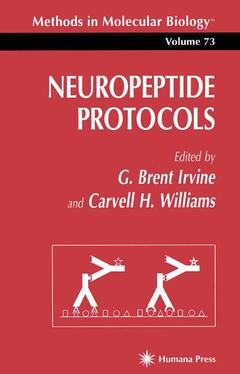Neuropeptide Protocols, Softcover reprint of the original 1st ed. 1997 Methods in Molecular Biology Series, Vol. 73
Langue : Anglais
Coordonnateurs : Irvine G. Brent, Williams Carvell H.

After 20 years of intensive effort, novel neuropeptides continue to be discovered, and the field of neuropeptide research is still expanding. As new analytical techniques become available, their applicability to the study of neu ropeptides brings fresh insights into the properties and functions of these ubiq uitous chemical messengers. Presented in this single volume, Neuropeptide Protocols, are 33 chapters covering these new techniques, together with more established methods. Each contributor is actively engaged in neuropeptide research and so brings to his or her description an awareness of the practical problems inher ent in the method, and provides sound advice on how to overcome them. The format conforms to the style of previous books in the Methods in Molecular Biology series. Each chapter provides an instruction to the technique, and item ized list of equipment and reagents, and a step-by-step set of instructions to enable practitioners to reproduce the method. The Notes section gives insights into pitfalls or critical stages, tips to overcome these obstacles, and sugges tions for extensions or modifications of the basic protocol. Neuropeptide Protocols is intended as a benchtop manual providing the entire gamut of techniques that form the essential tool kit of the practicing neuropeptide researcher. It will be useful for those new to the field, as well as for established workers who wish to try a new technique for the first time.
Preparation of Neuropeptide-Containing Fractions from Biological Materials.- Purification of Extracted Peptides for Structural Analysis.- Amino Acid Sequencing of Neuropeptides.- Neuropeptide Gene Identification Using the Polymerase Chain Reaction.- Solid-Phase Synthesis of Neuropeptides by Fmoc Strategies.- Incorporation of Stable Pseudopeptide Bonds.- Synthesis of Conformationally Restricted Peptides.- Purification of Synthetic Peptides by High Performance Liquid Chromatography.- Molecular Weight Estimation for Neuropeptides Using Size-Exclusion High Performance Liquid Chromatography.- Molecular Weight Determinations Using Polyacrylamide Gel Electrophoresis with Tris-Tricine Buffers.- Determination of Neuropeptides by Capillary Electrophoresis.- Characterization of Neuropeptide Processing by Fast Atom Bombardment Mass Spectrometry.- Analysis of Neuropeptides by Size-Exclusion HPLC Linked to Electrospray Ionization Mass Spectrometry.- Identification of Peptides by Matrix-Assisted Laser Desorption Ionization Time of Flight Mass Spectrometry (MALDI-TOF-MS) and Direct Analysis of the Laterobuccal Nerve from the Pond Snail Lymnaea stagnalis.- Use of Circular Dichroism to Determine Secondary Structure of Neuropeptides.- 1H Nuclear Magnetic Resonance (NMR) in the Elucidation of Peptide Structure.- The Study of Membrane- or Receptor-Bound Neuropeptides by NMR.- Molecular Modeling of Neuropeptides.- Tritium Labeling of Neuropeptides.- The Use of IODO-GEN for Preparing 125I-Labeled Peptides and Their Purification by Reversed-Phase High Performance Liquid Chromatography.- Production of Antisera Using Peptide Conjugates.- Radioimmunoassay.- Enzyme-Linked Immunosorbent Assay of Peptides.- Sample Preparation for Peptide Immunocytochemistry.- lmmunocytochemical Methods for Regulatory Peptides.- Ultrastructural Localization of Peptides Using Immunogold Labeling.- Preparation of a Membrane Fraction for Receptor Studies and Solubilization of Receptor Proteins with Retention of Biological Activity.- Radioligand Binding Using 125Labeled Peptides.- Analysis of Data from “Cold Saturation” Radioligand Binding Experiments.- Organ/Tissue Preparations for the Assessment of Agonist/Antagonist Activity.- Measurement of Efflux Rates from Brain to Blood.- Assay of Neuropeptidases Using Fluorogenic Substrates.- Characterization of Neuropeptidases Using Inhibitors.
Leading scientists offer an unprecedented suite of master protocols for analyzing neuropeptide structure and function using optimized classic methods and the latest state-of-the-art techniques. This comprehensive collection includes valuable techniques for extracting and purifying neuropeptides from biological sources, for their sequence determination by Edman degradation and PCR, and for the solid phase synthesis and purification of peptides and peptide analogs. Also covered are physical techniques for the characterisation of synthetic or natural peptides, methods immunocytochemical sample preparation and visualisation at both light and electron levels, and techniques for neuropeptide receptor interaction. Chapters on molecular modelling, radioisotopic labelling, production of antisera, t
Date de parution : 09-2013
Ouvrage de 386 p.
15.2x22.9 cm
Thème de Neuropeptide Protocols :
© 2024 LAVOISIER S.A.S.



